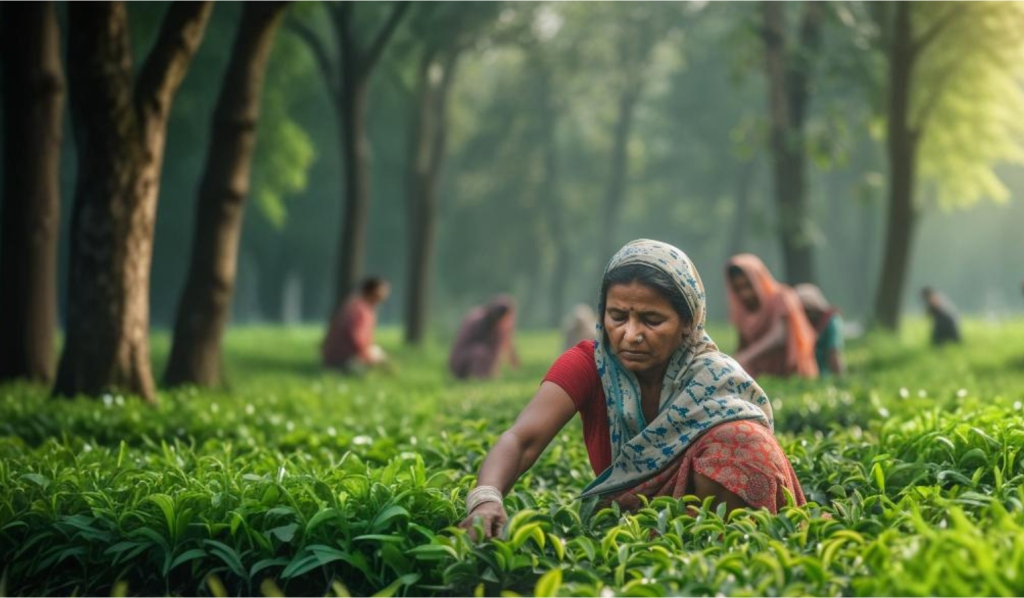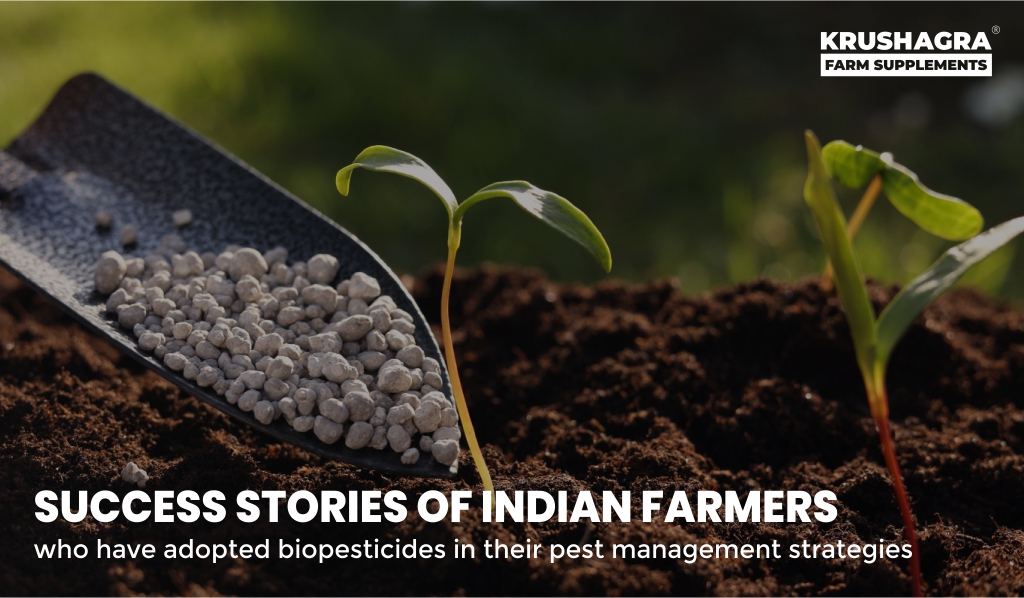In recent years, India’s agricultural sector has witnessed a transformative shift, with farmers increasingly turning towards sustainable and eco-friendly pest management solutions.
Among these innovations, biopesticides have emerged as a powerful tool, offering a way to control pests without the adverse environmental impacts associated with chemical pesticides.
Indian farmers adopting biopesticides are experiencing not only improved crop yields but also contributing to healthier ecosystems and communities. Here, we explore the inspiring success stories of Indian farmers who have made the switch to biopesticides and reaped the benefits.
Why biopesticides are crucial in Indian farming
Biopesticides are essential in modern agriculture as they provide a sustainable, eco-friendly approach to pest management, addressing several critical issues posed by traditional chemical pesticides.
Derived from natural materials such as plants, bacteria, fungi, and minerals, biopesticides are safe, targeted, and effective in controlling harmful pests without the adverse environmental impact associated with synthetic chemicals.
One of the primary benefits of biopesticides is their specificity. Unlike broad-spectrum chemical pesticides that can harm beneficial insects, biopesticides target specific pests, preserving valuable pollinators like bees and natural predators that help control pest populations.
This targeted action reduces the likelihood of pest resistance, a growing concern in agriculture where overuse of chemical pesticides has led to resilient pest populations, forcing farmers to use even more chemicals to protect their crops.
Biopesticides also contribute to healthier soil and water quality. Chemical pesticides often accumulate in the soil and can contaminate water bodies, negatively affecting ecosystems and human health.
In contrast, biopesticides typically decompose quickly, leaving minimal residues, which supports soil fertility and safer groundwater.
This environmental sustainability aligns with organic farming principles, as biopesticides allow farmers to maintain crop health while adhering to organic certification standards.
Moreover, biopesticides play a role in safeguarding human health. They are generally considered safe for farm workers and consumers, minimizing exposure to toxic chemicals.
This safety aspect is increasingly attractive as consumers become more aware of food safety and seek organic or ‘chemical-free’ produce.
With the rising global demand for sustainable and organic products, biopesticides are increasingly important in helping farmers meet these market needs while maintaining environmental balance.
Their adoption is a proactive step toward achieving sustainable agriculture, ensuring that both current and future generations have access to safe food and a healthy environment.

How biopesticides have boosted agricultural success
1. Empowering Small Farmers in Maharashtra with Biopesticides
In Maharashtra, a state known for its thriving agricultural activity, small-scale farmers in villages like Ahmednagar and Nashik are embracing biopesticides with great success. Previously, these farmers faced crop losses due to chemical-resistant pests and declining soil quality from overuse of chemical pesticides.
However, after attending local workshops on organic farming, they began incorporating biopesticides derived from neem, bacteria like Bacillus thuringiensis (Bt), and fungi like Trichoderma.
Key Outcomes:
- Reduced pest populations without harming beneficial insects.
- Healthier soil and improved nutrient content, which enhanced crop resilience.
- Higher market value of crops labeled as ‘organic’ and ‘chemical-free.’
2. Karnataka’s Organic Farming Pioneer Reaps Rewards of Biopesticides
In Karnataka, farmers with acres of vegetable and fruit crops, faced a severe pest infestation that threatened to wipe out his entire farm.
After years of loss and distress, many farmers took to using formulations made from natural enemies of the pests, such as viral biopesticides (NPV) and certain plant-based oils, instead of harsh chemical fertilizers.
Key Outcomes:
- Drastically reduced crop damage from caterpillars and other common pests.
- Greener, lusher plants due to the minimal toxic residue in the soil.
- Expanded his organic product line, as his crops qualified for ‘organic’ labeling due to the absence of chemical residues.
Today, these same farmers not only enjoy stable profits but have also reduced his operational costs by around 20%, as biopesticides are often more cost-effective in the long term.
3. Punjab’s Rice and Wheat Farmers Reduce Pest Resistance
Punjab’s rice and wheat farmers have traditionally relied on chemical pesticides, but they recently noticed that pests like the brown planthopper were becoming resistant.
Several farmers from places like Ludhiana, decided to address this issue by integrating biopesticides such as pheromone traps and microbial agents into his pest management strategy.
Key Outcomes:
- Significant drop in pest resistance, which reduced the need for repeat applications.
- Cost savings from reduced dependence on expensive chemical pesticides.
- Healthier crops and less contamination in irrigation water, benefiting local ecosystems.
4. West Bengal’s Tea Plantation Thrives with Biopesticides
Tea cultivation in West Bengal, particularly in regions like Darjeeling and Jalpaiguri, is extremely vulnerable to pests.
Several tea estate owners faced substantial losses due to aphid infestations. Seeking a solution, they have worked with local agronomists to implement biopesticide applications, using neem-based and microbial solutions.
Key Outcomes:
- Healthier tea leaves with a natural taste profile, meeting organic export standards.
- Safer work conditions for laborers, as they no longer handled toxic chemicals.
- Increased demand for his tea in international markets, boosting revenue by 30%.
These tea estates now stand as a model of sustainable tea farming, with successes such as these inspiring neighboring tea farmers to adopt similar methods.
5. Bihar’s Vegetable Growers See Boost in Profits and Crop Health
In Bihar, farmers growing tomatoes and cucumbers, found that biopesticides provided them with a more reliable pest control solution compared to conventional pesticides. Using a mixture of plant-based biopesticides and microbial agents prove particularly effective against aphids and mites.
Key Outcomes:
- Tomato and cucumber yields increased by 15%.
- Biopesticides cost less than chemical pesticides, reducing production expenses.
- Organic produce fetched a premium price in the local market, boosting income.
Such journeys are now a source of inspiration for farmers all over Bihar, many of whom are switching to sustainable farming practices to improve both income and food quality.

To Sum it Up
The success stories of Indian farmers adopting biopesticides underscore the immense potential of sustainable agriculture. By embracing these eco-friendly pest management solutions, farmers are not only safeguarding their crops but also contributing to environmental preservation and public health.
With more awareness and government support, biopesticides could become a staple in Indian agriculture, empowering farmers to achieve resilient and sustainable yields.
Takeaways for Farmers:
- Healthier Crops: Reduced chemical residue improves soil health and crop quality.
- Cost Savings: Long-term use of biopesticides reduces expenses on pest control.
- Market Demand: Consumers increasingly prefer organic, chemical-free produce.
For Indian farmers considering a transition to sustainable pest management, these success stories illustrate the positive impact biopesticides can have on crop health, profitability, and environmental sustainability.
Frequently Asked Questions
What are biopesticides?
Biopesticides are pest control agents derived from natural sources such as plants, bacteria, fungi, and minerals. They are used to manage pests in an eco-friendly way, causing minimal harm to beneficial organisms and the environment.
How do biopesticides differ from chemical pesticides?
Unlike chemical pesticides, which often target a broad range of insects, biopesticides are typically specific to certain pests, helping to preserve beneficial insects and reduce the risk of pest resistance. They also decompose quickly, leaving minimal residue in soil and water.
Are biopesticides effective in controlling pests?
Yes, biopesticides are effective and are widely used for targeted pest control. They can be particularly useful for managing pests that have developed resistance to traditional chemical pesticides.
Are biopesticides safe for human health?
Generally, biopesticides are safer for humans and farm workers than chemical pesticides, as they are derived from natural substances and produce lower toxicity. This makes them a good option for food safety and organic farming.
Why are biopesticides important for sustainable farming?
Biopesticides support sustainable farming by reducing the environmental impact of pest control. They improve soil health, preserve biodiversity, and allow farmers to grow safer, chemical-free produce, aligning with organic and sustainable agriculture practices.





